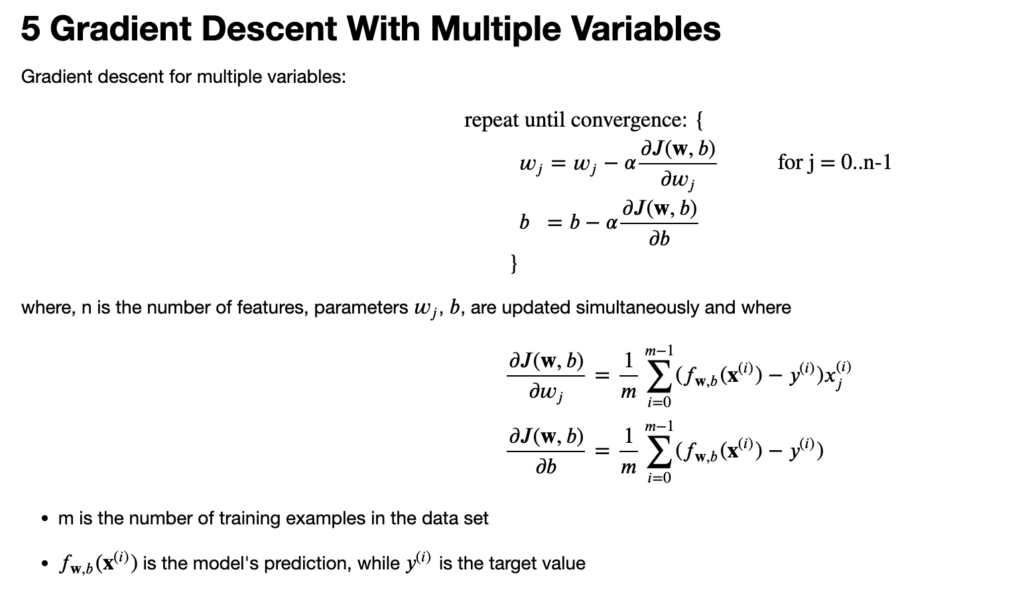The screenshot below taken from https://www.coursera.org/learn/machine-learning/home/week/2

import copy
import numpy as np
import matplotlib.pyplot as plt
#The training dataset(matrix) contains three examples with four features m=3 , n=4
X_train = np.array([[1, 2, 3, 4], [5, 6, 7, 8], [9, 10, 11, 12]])
y_train = np.array([10, 20, 30])
b_init = 0
# n is 4, w is a 1-D NumPy vector.
w_init = np.array([1, 4, -4, 2])
def predict_loop(x, w, b):
m = x.shape[0]
n = x.shape[1]
f_wb =[]
for j in range(m):
predict = 0
for i in range(n):
predict += w[i]*x[j,i]
predict += b
f_wb.append(predict)
return f_wb
f_wb = predict_loop(X_train, w_init, b_init)
print(f_wb)
def predict(x,w,b):
f_wb = np.dot(x,w) +b
return f_wb
print(predict(X_train,w_init,b_init))
def compute_cost(x,y,w,b):
m = x.shape[0]
cost =0
prediction = []
for i in range(m):
predict = np.dot(x[i],w) + b
prediction.append(predict)
cost += (y[i] - predict)**2
cost = cost / (2*m)
return cost, prediction
cost, prediction = compute_cost(X_train,y_train,w_init,b_init)
print(cost, prediction)
def compute_gradient(x,y,w,b):
m,n= x.shape
dj_w = np.zeros((n,))
dj_b = 0
for i in range(m):
predict = np.dot(x[i],w) +b
err = predict -y[i]
for j in range(n):
dj_w[j] = err*x[i,j]
dj_b += err
dj_w = dj_w/m
dj_b = dj_b/m
return dj_w,dj_b
def compute_gradient_descent(x,y,w,b, alpha,iteration, gradient_function):
w_temp = copy.deepcopy(w)
b_temp = b
for i in range(iteration):
dj_w, dj_b = gradient_function(x,y,w_temp,b_temp)
w_temp = w_temp - alpha*dj_w
b_temp = b_temp - alpha*dj_b
return w_temp,b_temp
print(compute_gradient_descent(X_train,y_train,w_init,b_init,0.01,9000, compute_gradient))
a = (compute_cost(X_train,y_train,[0.89285714, 3.88095238, -4.13095238, 1.85714286], 6.309523809523661)[0])
print(f"Cost {a:8.2f} ")
print(compute_cost(X_train,y_train,w_init, b_init))Enable gradient descent to run much faster : Feature Scaling